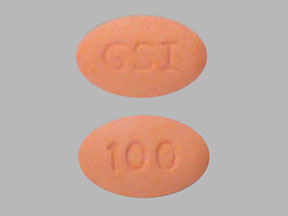Idelalisib and Alcohol/Food Interactions
There is 1 alcohol/food/lifestyle interaction with idelalisib.
Alcohol (Ethanol) Idelalisib
Moderate Drug Interaction
GENERALLY AVOID: Coadministration of idelalisib with other agents known to induce hepatotoxicity may potentiate the risk of liver injury. The use of idelalisib has been associated with elevations in alanine aminotransferase (ALT) and aspartate aminotransferase (AST) greater than 5 times the upper limit of normal. Serious and fatal hepatotoxicity occurred in 14% of patients treated with idelalisib in premarketing trials. Liver enzyme elevations were generally observed within the first 12 weeks of treatment and were reversible with dose interruption. Following treatment resumption at a lower dose, 26% of patients had recurrence of ALT and AST elevations.
MANAGEMENT: The use of idelalisib with other potentially hepatotoxic agents should be avoided whenever possible (e.g., acetaminophen; alcohol; amiodarone; androgens and anabolic steroids; antituberculous agents; azole antifungal agents; ACE inhibitors; cyclosporine (high dosages); disulfiram; endothelin receptor antagonists; interferons; ketolide and macrolide antibiotics; kinase inhibitors; methotrexate; nonsteroidal anti-inflammatory agents; nucleoside reverse transcriptase inhibitors; proteasome inhibitors; retinoids; sulfonamides; tamoxifen; tetracyclines; thiazolidinediones; tolvaptan; vincristine; zileuton; anticonvulsants such as carbamazepine, hydantoins, felbamate, and valproic acid; lipid-lowering medications such as fenofibrate, lomitapide, mipomersen, niacin, and statins; herbals and nutritional supplements such as black cohosh, chaparral, comfrey, DHEA, kava, pennyroyal oil, and red yeast rice). Patients treated with idelalisib should have serum ALT, AST, and bilirubin measured prior to initiation of treatment and regularly during treatment in accordance with the product labeling, and the dosing adjusted or interrupted as necessary. Permanent discontinuation of idelalisib is recommended in those who experience recurrent hepatotoxicity following dosage reduction. Patients should be advised to seek medical attention if they experience potential signs and symptoms of hepatotoxicity such as fever, rash, itching, anorexia, nausea, vomiting, fatigue, malaise, right upper quadrant pain, dark urine, pale stools, and jaundice.
References (1)
- (2014) "Product Information. Zydelig (idelalisib)." Gilead Sciences
Switch to consumer interaction data
Idelalisib drug interactions
There are 903 drug interactions with idelalisib.
Idelalisib disease interactions
There are 7 disease interactions with idelalisib which include:
- colitis
- dermatologic toxicities
- hepatic impairment
- infections
- intestinal perforation
- neutropenia
- lung toxicity
More about idelalisib
- idelalisib consumer information
- Check interactions
- Compare alternatives
- Reviews (2)
- Side effects
- Dosage information
- During pregnancy
- Drug class: PI3K inhibitors
- Breastfeeding
- En español
Related treatment guides
Drug Interaction Classification
| Highly clinically significant. Avoid combinations; the risk of the interaction outweighs the benefit. | |
| Moderately clinically significant. Usually avoid combinations; use it only under special circumstances. | |
| Minimally clinically significant. Minimize risk; assess risk and consider an alternative drug, take steps to circumvent the interaction risk and/or institute a monitoring plan. | |
| No interaction information available. |
See also:
Further information
Always consult your healthcare provider to ensure the information displayed on this page applies to your personal circumstances.


